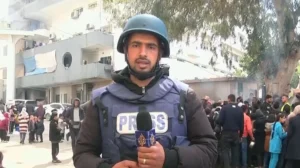Two Al Jazeera journalists were killed – and the West is silent

Al Jazeera correspondent Ismail al-Ghoul
Linah Alsaafin writes in Middle East Eye on 5 August 2024:
“After 300 days of continuous coverage with my friend and companion Ismail al-Ghoul, I saw him without a head.”
These were the horrific words of Al Jazeera correspondent Anas al-Sharif, his eyes streaming and pain etched deeply on to his face after 10 months of covering the unspeakable crimes wrought on his people by Israel’s brutal genocide in Gaza.
His colleagues, correspondent Ghoul and camera operator Rami al-Rifi, were targeted by an Israeli drone while wearing their press gear and travelling in a car clearly marked as a news media vehicle.
Their slaughter, which Gaza’s government media office reported brought the number of Palestinian journalists killed by Israel since 7 October to 165, barely made a ripple in mainstream media.
Western journalists, many of whom profit and make their careers from covering our stories with thinly disguised opportunism and internalised racism, not only deny us the right to narrate, but they have also been nauseatingly silent over the industrial mass killing of their Palestinian counterparts.
Contrast this with the frenzy of coverage upon the Thursday release of Wall Street Journal reporter Evan Gershkovich from a Russian prison. Yet, the two beheaded Palestinian journalists scarcely registered as a blip on the western media’s radar, a damning indictment of the profession itself.
The lack of empathy for Palestinian journalists from international organisations has also been concerning, with weak statements that express “concern” or endless repetitions of the “journalism is not a crime” adage. This comes instead of genuine action to protect those risking their lives to report from Gaza or to actively reject the Israeli talking points that set the agenda for many newsrooms.
The statement from the Committee to Protect Journalists (CPJ) in response to the killing of Ghoul and Rifi is a classic example, expressing “dismay” and feebly calling on Israel to “explain why two more Al Jazeera journalists have been killed in what appears to be a direct strike”.
Racism and dehumanisation
As prominent journalist Laila al-Arian correctly points out, the only rationale for demanding an “explanation” from Israel on the killing of journalists doing their job is that Palestinians are assumed guilty and must prove their innocence, even in death, while Israel is repeatedly given the benefit of the doubt.
The complicit silence of international journalists suggests that they view their Palestinian counterparts as subhuman – as lesser beings, not worthy of life. Through this process of dehumanisation, Palestinian journalists are deemed untrustworthy to report on the crimes and violence meted out to them by a fanatical military power backed and aided by most western governments.
We are too emotional, too close to the story and not to be taken seriously. I have faced such racist judgments from several editors I have had the displeasure of working with in newsrooms, while the ill-informed work of white British or American reporters was taken without question as the yardstick of editorial credibility.
Ghoul was the epitome of journalistic integrity. The 27-year-old carried out his duties without ever allowing his personal losses and painful sacrifices to impact his work. His brother Khaled was killed in March during Israel’s raid of al-Shifa hospital; he was separated from his wife and young daughter, who were displaced to southern Gaza late last year; and he lost his cancer-stricken father, who managed to travel abroad for treatment but died in Qatar.
